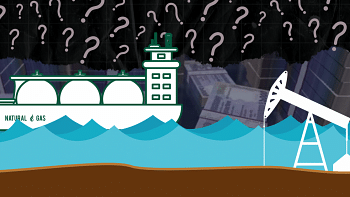Import dependence is the root cause of our energy crisis

Recently, our State Minister for Power, Energy and Mineral Resources Nasrul Hamid has said that Bangladesh does not have much unexplored gas and that this is why we need to import liquefied natural gas (LNG). But this statement contradicts reality.
First, his comment contradicts the findings of surveys done by different foreign organisations in the past. According to the last report by Gustavson Associates published in 2010, Bangladesh has at least 38 trillion cubic feet (Tcf) of undiscovered gas. Even the government's own gas sector master plan of 2017 (published in 2018), prepared by Denmark-based engineering consulting company Ramboll, acknowledged the 2010 findings to recommend investment in gas discovery.
Second, the government has not invested sufficient effort into discovering potential reserves over the last 15 years. Without conducting surveys and drilling, refusing to recognise past findings is akin to evading accountability.
Third, different news reports and research findings have informed us of the huge amounts of unexplored gas in the Chittagong Hill Tracts, and in Sylhet, Bhola, and Shariatpur districts. The government has already taken initiatives to explore some of these areas. As such, does the state minister's comment on our gas reserves not contradict the government's own gas exploration initiatives?
In the gas sector master plan of 2017, it was recommended that the government should not spend money to import costly LNG and should explore indigenous gas instead. The plan estimated that Bangladesh would have to spend $3 billion by 2030 to import LNG, while exploration of indigenous gas resources will be much more cost-effective.
However, we haven't seen much initiative from the government to do so. After the gas crisis hit the country last year, Bangladesh Petroleum Exploration and Production Company Limited (Bapex) urgently started exploring new gas fields. The government's proactive role instantly made it obvious how neglected our gas exploration activities have been in the past. After the crisis began, Bapex drilled nine wells and saved at least Tk 1 lakh crore on LNG import by spending only Tk 812 crore. This means that Bapex can extract gas at a much lower cost, whereas buying LNG from the spot market requires huge amounts of forex reserves.
Even if the government can import LNG from the spot market at a relatively lower price than what it is during times of peak demand, there is no guarantee that the price would not increase in the future. Therefore, it is not sustainable to rely on LNG imports for ensuring energy security.
The increasing import dependency over the last decade is at the root of our current energy crisis. This dependence will only increase if we continue to become dependent on imported coal and LNG. The Rooppur nuclear power plant itself involves massive import of technology and fuel.
This year, the Rampal power plant has already started to supply electricity to the grid. Although the government had informed us that the per unit cost of electricity would be Tk 8, recently we found out that the cost is Tk 14-15. Electricity from Adani's Godda coal power plant is also being supplied to our grid at high costs. So, we are still implementing the plans we made in 2010.
The master plan seems to have been developed more to serve the interests of producers and technology suppliers than to ensure energy security. As a response to external shocks, our energy security is now at peril because when the dollar crisis came about, the import-dependent energy sector was hit first. Sadly, the wide range of discussions held on these issues recently could not stop the government from pursuing plans it had already committed to, such as power plant constructions and the imbalanced contract with Adani.
Now, traders and businessmen are worried about whether they will get enough gas after paying the increased prices. Their concerns have valid grounds, too.
The government's new projects are facing a crisis due to our declining forex reserves. We recently saw that it delayed paying to import coal for Payra. There was also a delay in producing electricity at the Rampal power plant due to coal import payment having to be in US dollars. Under these circumstances, businesses are losing faith in the government's ability to pay for imported LNG from the spot market. Recently, the LNG price has come down to $14 and the government is planning to import it from the spot market.
Even if the government can import LNG from the spot market at a relatively lower price than what it is during times of peak demand, there is no guarantee that the price would not increase in the future. Therefore, it is not sustainable to rely on LNG imports for ensuring energy security. What we need to do instead is explore our own gas resources. There is no alternative to discovering new gas fields and starting gas exploration. It is in no way believable or acceptable that we do not have any gas left.
Moreover, offshore exploration has bright prospects in the country, but we are yet to explore our offshore blocks. While Myanmar has already discovered some offshore gas blocks, we have not conducted any proper surveys yet. Experts think that there is huge potential in deep sea blocks because the blocks of Myanmar and Bangladesh share similar geological structures. ExxonMobil has proposed a production sharing contract (PSC) to do surveys on the deep sea blocks, and the government is considering this proposal.
The price of gas as per the current PSC is $2.75. The new contract may offer around $10. Bangladesh's share of profit gas might also go down from between 55 percent to 80 percent down to 40 percent to 70 percent. No matter what, we can guess that signing a PSC with any foreign companies will only allow them to take control of our indigenous resources.
To say that we do not have the capacity to explore offshore blocks is illogical. No country in the world starts exploration after developing their capacity, they build it through their efforts and a slow process of technology transfer. A company like India's Oil and Natural Gas Corporation (ONGC) itself outsources its tasks to other companies abroad. Bangladesh can develop its capacity by outsourcing some tasks, retaining overall control over management, developing its regulatory institutions and human resources, and closely engaging in the technology transfer process.
We have previously seen how the government expressed doubts about Bapex's capacity to explore new gas fields and how it hired foreign companies like Gazprom to spend three times more money. This approach proved to be unsustainable. Instead of being dependent on foreign companies for gas exploration, we should establish our own control over the sector in order to ensure true energy security.
Moshahida Sultana Ritu is associate professor of Economics at the Department of Accounting and Information Systems, University of Dhaka.

 For all latest news, follow The Daily Star's Google News channel.
For all latest news, follow The Daily Star's Google News channel. 











Comments